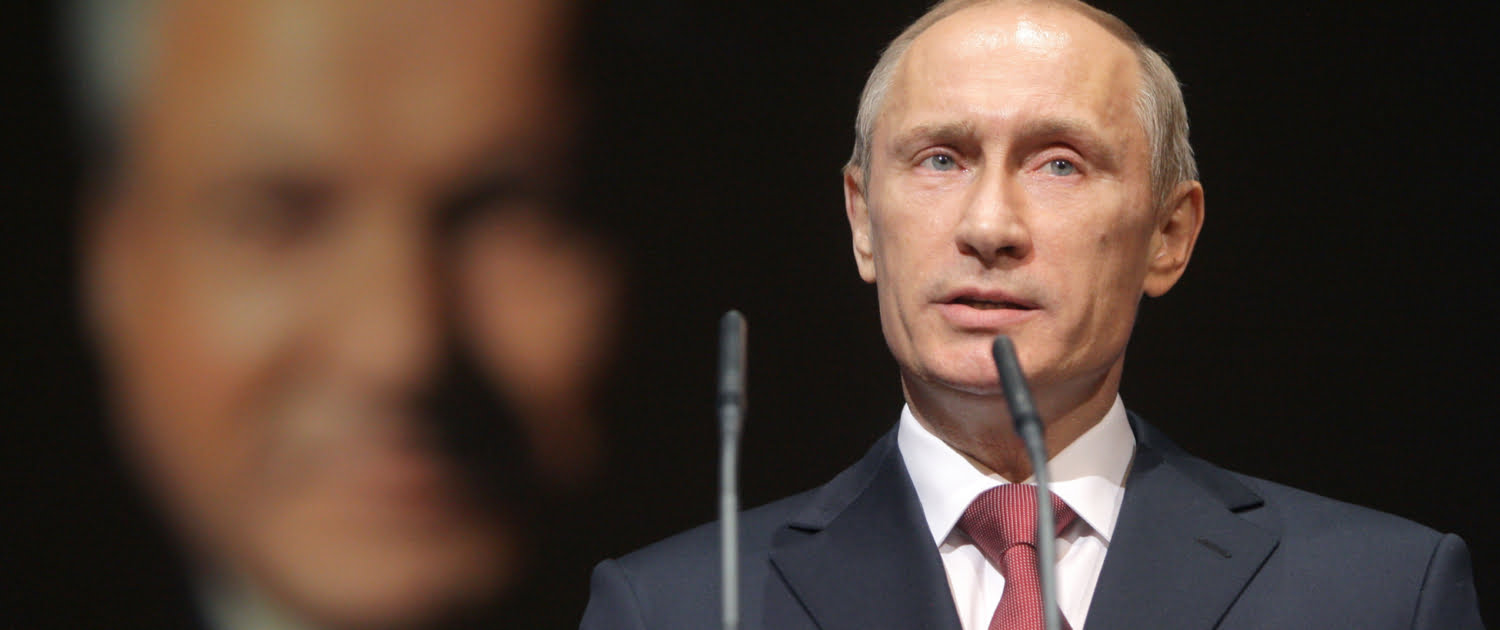”If everyone had fought only for their faith, the war would not exist.”
Leo Tolstoy (War and Peace)
The best way to unite a people is to find an external enemy. It often helps and has been approached by many countries in history. Both against invented and real enemies. For example, during Stalin’s terrorist period, the people agreed to ’fight’ against counter-revolutionaries and foreign agents who wanted to destroy the free proletarian country of the Soviet Union.
We also see the same unification of the people during the Second World War when Stalin’s leadership fought against fascism. In the history of modern Russia, we saw how Yeltsin simply won his presidential election for the first time when he united the people to fight communism and dictatorship. During his second round of elections, strong American involvement and the war in Chechnya helped him.
It was also the civil war against the terrorists in Chechnya that helped Putin win his first presidential election. The intervention by Georgia against South Ossetia, where several of the Russian peacekeepers had been killed by Georgian soldiers, also significantly increased Putin’s popularity. Using war is tempting when needed. However, the important thing is to find an enemy you can defeat. In addition, it must be a safe and short-lived war – losing in this position is equivalent to signing one’s own death sentence. All Putin had to do was find the ’right enemy’, which turned out to be easy. He was already in front of his nose and invited himself. The enemy’s name was the United States and NATO ”.
The Winter Games in Sochi
For many years Putin had appeared in front of the cameras as a machoman and hero. He saved Siberian tigers and other rare animals; he flew fighter planes and played hockey or competed in judo; he was diving to look at a submarine wreckage and rode with bare torso. It used to help the opinion numbers rise. In September 2012, a couple of new initiatives only helped temporarily. He patted a large octopus in the oceanarium on the island of Russky, and he helped to ‘rescue’ the rare Siberian Crane kids by teaching them to fly with help of a motorized delta plane.
The result became the usual – the opinion figures rose and then collapsed. Now there was only one thing left – the Sochi Olympic Winter Games, which Russia hosted in the spring of 2014. They would take place with a big pomp at any cost to reach the goal: to surpass everything that had happened before and surprise the world. However, preparations for the Olympics showed how big the corruption still was in the country and how the government was permeated. People joked and laughed at both Putin and his politics. “Many countries had organized the Olympics in interesting places, but this is the first time it would take place at the president’s private summer venue.”
“Those in Hungary paid 10 billion euros to build a nuclear power plant! Imagine that our ski jump slope in Sochi is just as cheap! ”
If Putin hoped that the methods of the ancient Roman empire would make people refrain from protests by arranging a spectacle, he failed. Although it was fairly calm on the surface, the fire continued to whirl beneath the surface. The people were still unhappy with Putin and his politics. Major measures were needed to reverse the falling public opinion trend. Something that would unite the people and return the love to him as during the first years of his ministry.
Vladimir the Great
By following Putin and his politics, one could say that he will go to history as Vladimir the Great. This despite the fact that as he said about Yeltsin:
“It was in the office next door. He invited me and said that he wanted to nominate me as prime minister and that I would then run for office. I explained to him that it was a big responsibility that required me to change my life. And I wasn’t sure I was willing to do that. And taking responsibility for Russia was very difficult in August 1999, when Boris Yeltsin proposed me as Prime Minister and Parliament supported that decision. The Second Chechnya War started the same month and it became a trial for the country. Frankly, I didn’t know then about President Yeltsin’s final plans for me. But that was the situation and I had to take responsibility for it. I didn’t know how long I was going to make it”.
But Russia is Russia and in order to become a great leader in Russia you have to do something like Peter the Great, Catherine the Great, and Stalin did. It is often said that it is the victor who writes history, and for him to be able to write the history, the question is what he will do. It was not enough for Putin to win the subtle war on terror in Russia, nor the “help” to the Russian citizens of South Ossetia who were attacked by Georgia. There must be something bigger, that will be noticed all over the world and thus write him in the history books. Putin is more cunning than many other politicians. He can think and plan in silence and plan in detail. He has time to wait for the opportunities and he can actually make the decisive decisions alone.
As president, he is head of state and commander-in-chief in one and the same person. There is a clause in the Russian constitution that states that the president can get free hands if he gets a mandate from the upper house of parliament to start a war. The same powers has the president of the United States.
Putin is careful about his image, at least at home. His purpose is to appear as a ‘knight’, or perhaps a ‘savior’ – not a villain. He has already made many such spectacular and popular rescues. He has rescued both endangered birds and predators as well as Siberian tigers. Putin personally monitors and has implemented a range of protection programs for rare and endangered animals in Russia. He does everything to win the people’s love, even though it sometimes looks pathetic. Despite throwing dirt from the West, he says that the LGBTQ movement has great success here and is awarded state awards for its efforts. It is not subject to any discrimination whatsoever. Putin has now become a hero at home by returning Crimea to ‘Mother Russia’, but to portray himself as a savior requires much more – for example, to be a peacemaker. If he stops NATO’s and the US’s advance towards Russia, he will receive support from most Russians at home and abroad.
One can also imagine that there are many countries around the world who would gladly see a detronized United States – not least in the Middle East and South America. Implementing such a plan does require a lot, but it is not an impossible goal. With a long-term and thoughtful planning, the dividend would be huge. Putin should get what he wants. But what is needed to achieve that goal?
A warm war would only reinforce the European countries’ willingness to rally around NATO, while discrediting would make NATO appear as a toothless alliance that is unable to resolve conflicts and provide assistance if any of the alliance’s countries are attacked.
Discrediting NATO and at the same time dethrone the United States would serve Putin’s purpose as a glove. Then the very purpose of NATO would be undermined and literally cause the alliance to collapse like a house of cards. There would be no reason whatsoever to join NATO if the alliance could not fulfill its commitment to defend its members from outside attacks.
Maybe even the US armor could be limited and you could devote yourself to fighting terrorist attacks instead. However, it would greatly affect the US military material industry which is very important for the US economy. However, acting against the EU and NATO is very risky. Europe has a much larger population and better economy. In the EU countries, 508 million people live, compared with just under 140 million in Russia.
So far, Putin has taken the following preparations and actions:
- Legal measures have been taken by introducing amendments to the Russian Constitution and to the military doctrine that Russia has the right to support its countrymen in other countries with military intervention in an emergency.
- The Russian army is prepared, trained and properly honed through large scale exercises of recent years on land, in the air and at sea.
- The peacekeeping capabilities have already been tested in South Ossetia, Georgia, Crimea and now in Syria. The outside world found excuses not to interfere too much in these conflicts. The economic sanctions that the countries after pressure from the USA reluctantly decided on are obviously hurting the Russian economy, but they are hurting the EU countries even more and can also strengthen the Russians’ willingness to defend themselves.
NATO Threatens World Peace
The only enemy Putin can see, when this is written (2018), as a threat to world peace is NATO. Already in 2008, Putin warned US President George W. Bush that Russia did not want NATO to invite Georgia and Ukraine as members. Putin was very opposed to this and openly said that he did not like the possible NATO enlargement and the placement of NATO bases in these countries.
Putin also warned that he would take action, including the use of nuclear weapons, should Russia’s security situation be disrupted or the country attacked. I don’t think anyone at this point understood what he was saying. Russia, then, is still very weak with an economy and a defense that is still only one-twentieth of NATO’s.
What they didn’t realize then was that Putin was serious. Russia’s defense budget is US $ 46 billion against NATO’s US $ 1041 billion. Already at that time it had been identified which bottlenecks there were from a defense point of view and which priority areas should be chosen. There were ‘hot’ places in Ukraine, the Baltic States, in the Black Sea where the Russian fleet was in a vulnerable position, and in Moldova where Russian-speaking people had proclaimed an independent state in Transnistria.
Putin to Bush: “Ukraine is an artificial country”
When Putin was upset by President Bush’s proposal to accept Ukraine in NATO, he is believed to have said warmly to George Bush – ”Ukraine is an artificial country, just like Indonesia”. There was a lively discussion that Ukraine would soon fall apart in several ’original parts’ whose territories belonged to several European countries before the First and Second World Wars and were awarded the Soviet Union and other European countries as war reparations.
Ukraine does not exist as an independent state until 1991. Ukraine’s first president was Leonid Kravtjuk, who was appointed on December 5, 1991; he was formerly highly regarded in the old Communist Party. Together with Boris Yeltsin and Belarus’s then-leader Stanislaŭ Shushchevich, Kravtjuk was behind the formation of the Commonwealth of Independent States OSS on December 21, 1991.
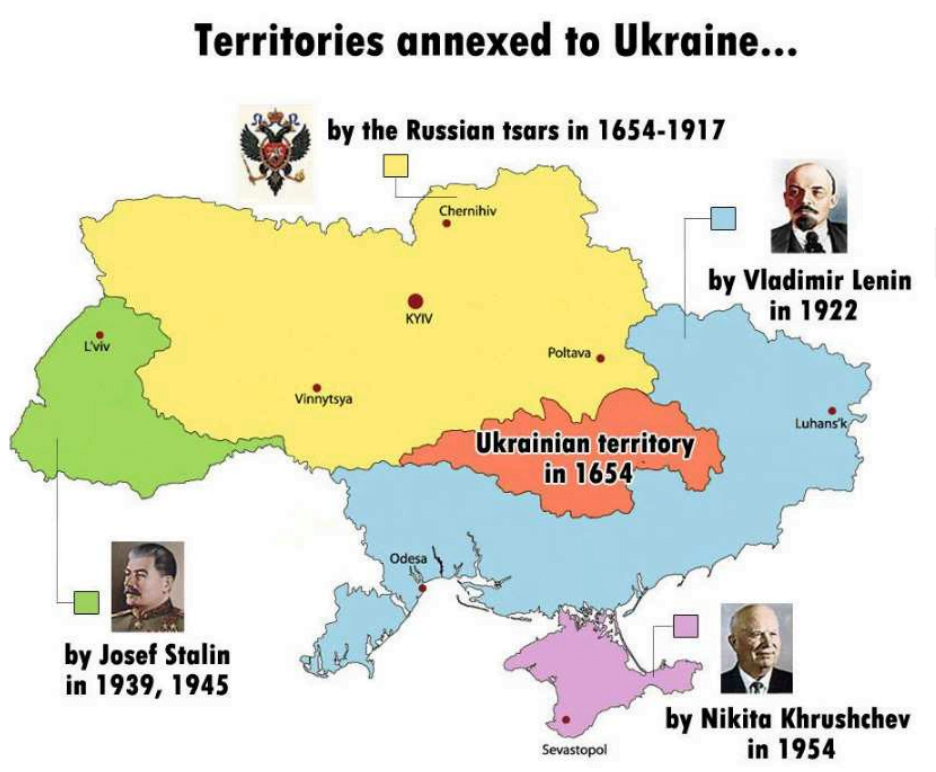
Fact Box on Ukraine
Ukraine is an East Slavic word for the country at the border, and as such is constantly disputed and usually dominated by stronger neighbors, especially Russians and Poles. In this way, fertile, strategically and communicatively important Ukrainian territory has worked throughout history.
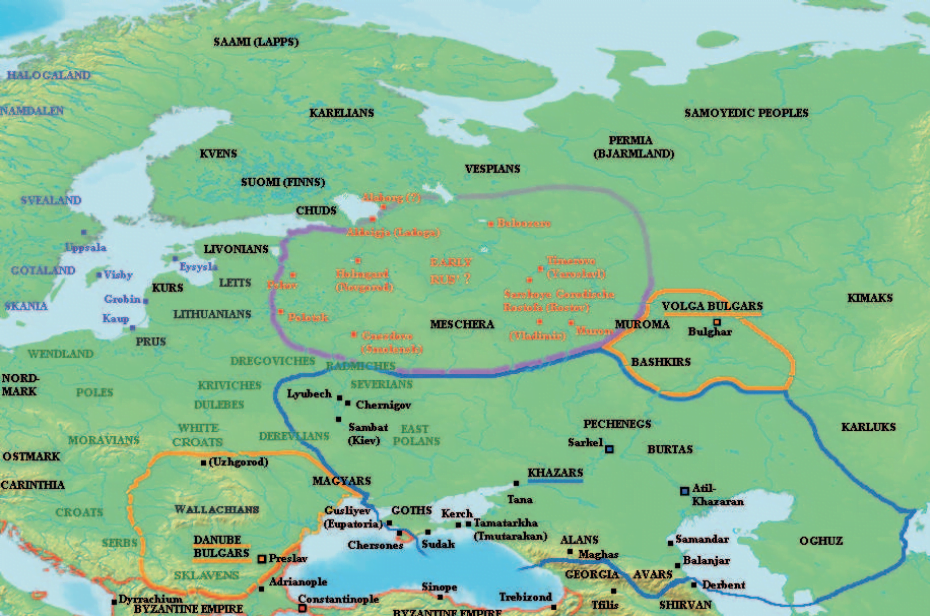
The Rus-Khaganate is the name applied by modern historians to a state formation that is believed to have existed during a poorly documented period in the history of Eastern Europe, about the late 700s to the second half of the 800s. It is believed that the Rus-Khaganate was a state. or cluster of city-states, set up by a people known in the Arabic sources as al-Rus’. The names in red are identified as Gotland trading places. The area within the blue line is the Khazar-Khaganate in the 8th century.
The Kiev-Russian Era 882-1240
In the north of Ukraine, in the late 800s, the vast but fragmented Kiev-Russian Empire, Kiev-Rus, (Garðaríki) emerged. Gotlandic Varangians, in the Arabic sources called al-Rus, had already settled in the East Slavic area at the end of the 700s. They forced their subordinates to feed them and provide merchandise to be used in trade with Baghdad. A number of Gotlandic bases have been excavated from the late 700s to the second half of the 800s in present-day Russia and Belarus and all the way to Volga. The early phase of this loosely structured Gotlandic Varangian empire is sometimes called the Rus-Khaganate. The Rus-Khaganate was a cluster of support points set up by Gotlandic merchants, Varangians.
According to the earliest chronicle of the territory, the future Kiev-Rus was divided between the Varjags and the Khazars. But around 860, the Varjags were driven back beyond the sea and they decided to rule themselves. There was no law among them, and tribe rose against tribe. Disagreement arose among them, and they began to wage war against each other. They said to each other, ”Let us seek a prince who can rule over us, and judge us according to the law.”
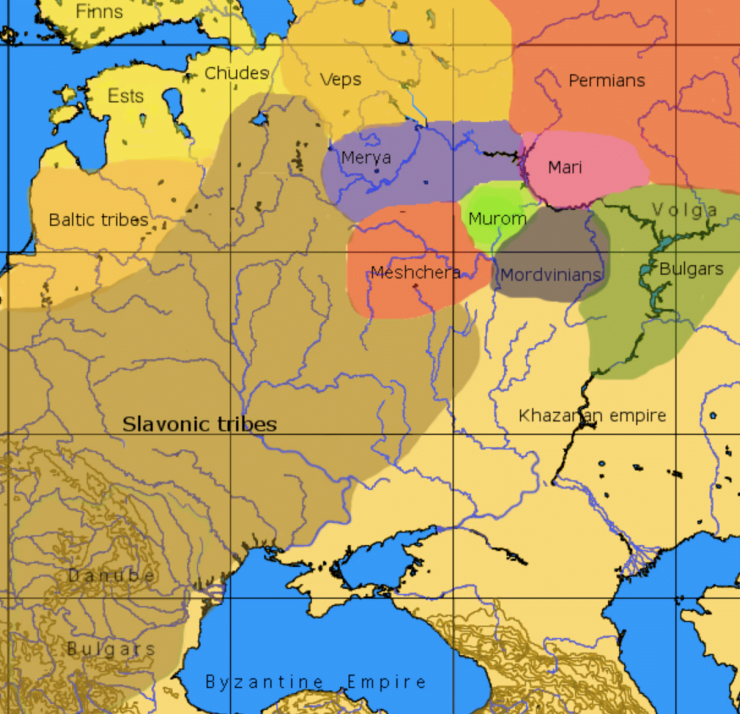
Map of the cultures of European Russia at the arrival of the Varjager and before the beginning of Slavic colonization.
They therefore went abroad to the Gotlandian Varjags (al-Rus’, Rhos). These tribes then told the Varangians, “Our country is big and rich, but there is no order in it. Come to rule us ”. They chose Oleg who in 882 conquered Kiev from the Khazars and made it their capital. Kiev grew in the 900s and 1000s into a powerful commercial and cultural center within KievRus, by the Varangians called Garðaríki.
When Kiev-Rus in 1240 fell apart by the Mongols’ attack, the Galizuik-Volynic Principality, also known as the Rutinian Empire, which was then divided between Poland and Lithuania, emerged in the west. The Grand Principality of Lithuania eventually began to unite the Ukrainian countries and in 1398 the Lithuanian-Ruthenian-Samogitian Grand Principality was established.
In present-day central Ukraine arose in the 15th century the Cossack state of Zaporizhia Sich, which over time managed to liberate an ever-larger area from Poland. However, it required alliances with other powers. Those on the southwest side of the Dnieper came under Polish and Lithuanian control. The north-eastern part became a principality under Moscow’s control.
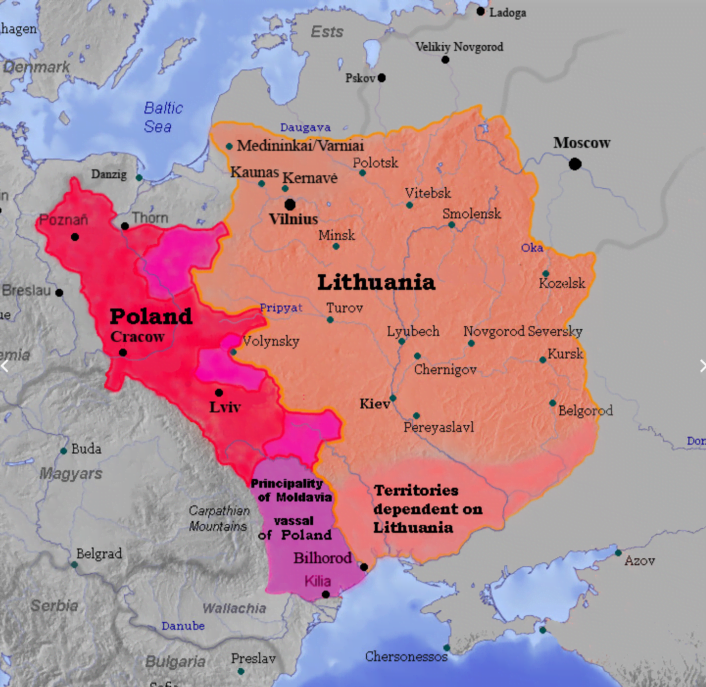
The Grand Principality of Lithuania eventually began to unite the Ukrainian countries and in 1398 the Lithuanian-Ruthenian-Samogitian Grand Principality was established.
The Cossacks swore the oath of allegiance to Tsarist Russia
The Ukrainians on the southwest side were mainly peasants, who were given an increasingly sacrilegious position, especially since noble Polish landlords were able to expand their property. Living in slavery was never in the nature of the Ukrainians.
The social and religious conflicts led to political opposition to the Polish state power, especially among the aspiring Ukrainian Cossacks, who rebelled against Poland in 1648 under the leadership of the hetman Bogdan Khmelnitsky. However, to free himself from Poland, the Hetman needed support. He allied himself with the Ottoman Empire, and won the war. However, he was betrayed by his allies and forced to sign an unfavorable peace agreement, and remain within the Polish-Lithuanian Commonwealth.
However, he had not forgotten the freedom of thought and turned to Moscow in the same year – 1648, to gain more understanding and support and proposed to form a union. Moscow hesitated. For Tsarist Russia, this meant going directly into war against Poland. The Hetman then turned his eyes to Sweden, which at that time was a major player in Europe. Desperately he sought support from the Swedish king Karl X Gustav, but got the opposite.
Again, he turned to the Tsar in Moscow in the belief that Ukraine would have an autonomous position. After years of courting, Moscow decided to join Bogdan Khmelnitsky, the head of the Cossacks in Union in 1654. Chmelnitskyi swore the oath of allegiance to Tsarist Russia at an open council meeting in the city of Perejaslav in January 1654. As expected, the Polish-Russian war broke out in 1654 and ended in 1667. After the Russian-Polish war, Kiev and the country east of the Dnieper were gradually incorporated as an integral part of Russia, called Lesser Russia. The Cossacks were given a special position in Russia, which meant that no serfdom would be introduced. In return, they would carry out border guard in Russia’s south-west against Poles, Ottomans (Turks) and Tatars.
The First World War finally gave the Ukrainians a chance by the collapse of both the Habsburg and Romanov empires and a number of republics were formed, claiming independence. The largest of them was the Ukrainian People’s Republic, based in Kiev. On December 1, 1918, a union was concluded between the Western and Ukrainian people’s republics. At the same time, the different management traditions created tensions between Lviv and Kiev.
Russia’s legitimate security interests
It is a silent (and closely related) American denial that Russia has any legitimate security concerns outside its own territory, even in ethnically related or neighboring former Soviet republics such as Ukraine, Belarus and Georgia. Perhaps aware that the denial is confusing, US officials sometimes admit that ”even authoritarian regimes have legitimate security interests”, but always followed by ”but” and the undoubted consequence that it is for Washington to determine what those ”interests” might be.
How else can one explain, a bellwether example, by Richard Holbrooke, perennial Democratic secretary of state and ’special envoy’ under Obama? While simultaneously condemning the Kremlin for promoting a pro-Moscow government in neighboring Ukraine, where Russia has centuries of shared linguistic, warlike, religious, economic and security ties, Holbrooke declared that this distant Slav nation is part of our ”core zone of security” ’.
Even more, one had the audacity to claim that Russia does not have full sovereignty within its own borders, as expressed by constant US intervention in Moscow’s internal affairs since 1992. The ultimate expression of this ’missionary’ assumption was of course the 1990s US crusade, which had features of Washington’s efforts to dictate the Kremlin’s domestic and foreign policy, along with ”advisers” in place who were determined to steer Russia’s ”transition” from communism. The Great Crusade ended, or at least diminished, but endless American sermons far from continued, often associated with threats, about how Russia would and would not organize its political and economic systems, and so did active American support for Russian anti-Kremlin groups, some associated with hated Yeltsin era oligarchs in exile.
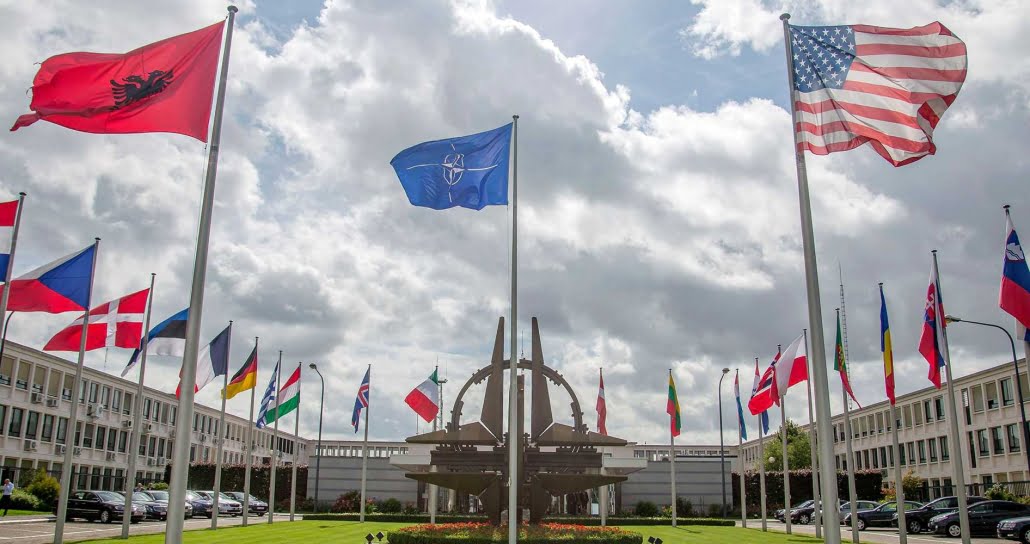
By 2006, this intervention impulse had grown into proposals such as overthrowing Putin through the kind of US-backed ’color revolutions’ conducted since 2003 in Georgia, Ukraine and Kyrgyzstan. Thus, while most common editorial pages called the Russian president ’thug’, ’fascist’ and ’Saddam Hussein’, one of Carnegie Endowment’s several Washington crusaders assured politicians of ’Putin’s weakness’ and vulnerability to ’regime change’.
Are not supporters of ’Democratic regime change’ in Russia ever thinking that it could mean destabilization of a nuclear state?
Similarly, the more established Council of Foreign Relations proposed that Washington reserve the right not to approve Russia’s future elections of its leaders and declare them ’illegal’.
Reinforcing these components of real American politics has been familiar double standard norms in the Cold War for condemning Moscow for doing what Washington does – such as seeking allied and military bases in former Soviet republics, with their assets (oil and gas in Russia’s case) to help friendly governments, regulate foreign money in their political lives, and recognize the spun-off territories after using force to assist them.
Specifically, when NATO expanded to Russia’s front and rear door, swallowing former Soviet bloc members and republics, it was to ’fight terrorism’ and ’protect new states’. When Moscow protested, they were engaged in ’Cold War thinking’. When Washington interfered in Georgia and Ukraine’s politics, it was ’to promote democracy’. When the Kremlin did so, it was ’neo-imperialism’. When US bombers attacked Serbia on behalf of Kosovo, it was ’defending human rights’. When Russian forces entered Georgia on behalf of South Ossetia and Abkhazia, it was ’an insult to civilized standards and totally unacceptable’.
At Valdai October 18, 2018, Putin said that the only way to resolve the crisis in Ukraine was to fulfill the so-called Minsk agreement of 2015, ie. implement decentralized reforms and give the people of eastern Ukraine comprehensive self-government. Today’s Ukrainian leadership obviously does not want to do that. Russia can only hope that Ukraine will have a leadership after the elections in Ukraine, which they can cooperate with. Joking aside, Putin usually reveals his thoughts in the joke. Or as you usually say in Russia – “in every joke there is a small amount of fun, everything else is truth”.
The truth is that they are really afraid of NATO’s enlargement to the east and its exercises at Russian borders. The military doctrine of 2014 clearly shows the uncertainty and vulnerability that Russia openly shows. The balance of power that previously existed during the Cold War no longer exists. On the contrary! If the US and the Soviet Union had previously ‘competed’ for influence in the Third World, the conflict in Yugoslavia, Serbia, Kosovo and Georgia came so close to Russia’s borders that it seemed very alarming. One risk that the NATO countries and their allies are standing on a partially erroneous basis regarding Russia is that politicians who are often ignorant make decisions based on delusions.
Another and more tangible risk that has become a fact is that some countries, through threats and pressures, force other countries to implement political measures that they do not really want.
In a 2013 report from the Swedish Defense Research Institute FOI, Jakob Hedenskog and Carolina Vendil Pallin wrote the following:
“NATO’s enlargement and its robot defenses in Europe will continue to be regarded as military dangers by Russia. The technological backlog explains why Russia perceives this as a danger that could develop into a threat. Strategic nuclear weapons and deterrence will continue to be the focus of Russian strategic thinking. From a Russian perspective, the later phases of NATO’s robotic defense may undermine Russia’s second-rate capability. Maintaining ‘global strategic balance’ is one of the most important functions for nuclear weapons in Russia’s National Security Strategy and the Military Doctrine emphasizes strategic deterrence in peacetime. In addition, Russia’s armed forces must be able to deal with both regional and local wars in Russia’s vicinity, as well as terrorist threats and radicalism. Russia is likely to continue to see military dangers in all these strategic directions.”
The natural reaction to the fear can be either to freeze, attack or escape. There is probably no other alternative. We humans, even politicians, function that way and are created in such a way by nature. Perhaps, given human nature, it is not difficult to imagine what reaction Putin will show. At a recent meeting, the United States stated that Russia is preparing for war. “Yes, Russia is preparing for war, I can confirm it”.
A Russian diplomat has both confirmed and denied what US war hawks have called out. Moscow is really preparing for war, he said. Only if the US starts a war. Speaking at the UN, Andrey Belousov, Deputy Head of the Russian Foreign Ministry’s non-proliferation and arms control department, said that Russia is indeed ready for war, so it can defend its people against American aggression. Russia’s military build-up and large-scale exercises, often painted in the Western media as preparations for all-out war, are a defensive necessity, he said.
”We are preparing to defend our homeland, our territorial integrity, our principles, our values, our people.”
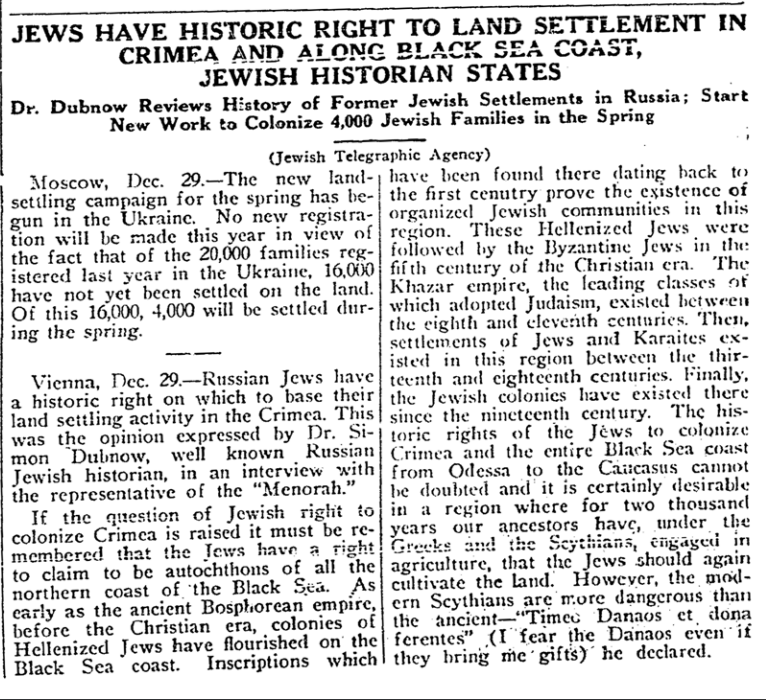
Jewish Telegraphic Agency. 30 December, 1926. http://pdfs.jta.org/1926/1926-12-30_656.pdf


